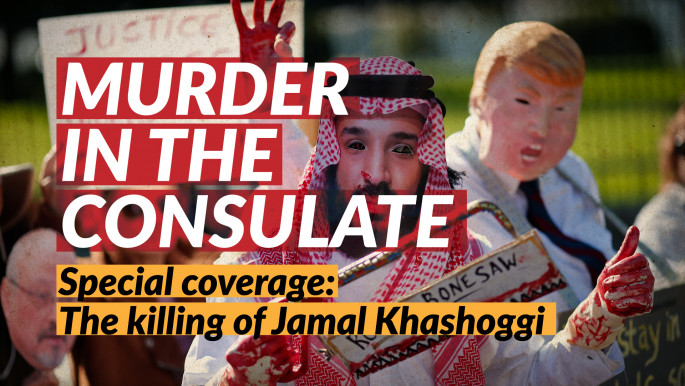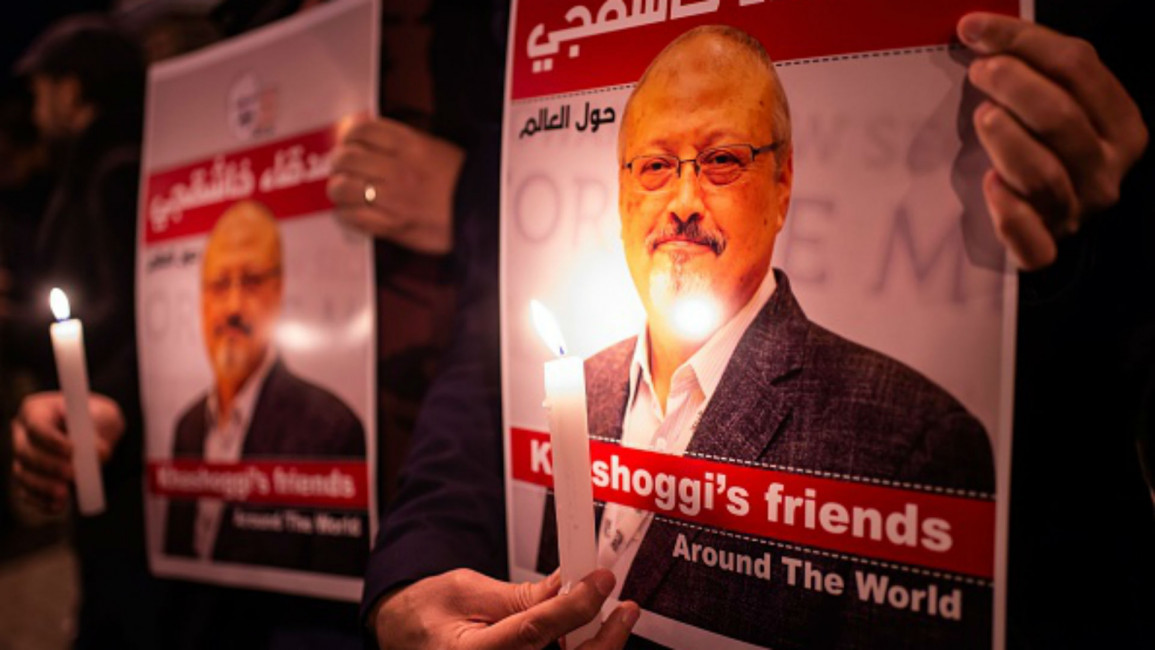
Khashoggi and the Arab Spring: A Saudi counter-revolution
On first glance, one might wonder why the Kingdom might risk so much to kill one single critical individual, but on a closer look at recent Saudi policy, this desperately savage act has emerged from the Kingdom's increasing need to project its power across the region - a policy that hinges on projecting the image of MbS as a 'reformist' golden boy.
Khashoggi in this sense was a troublesome thorn in MbS' side, and was, after all, an insider 'dissident'. He tragically became a skeleton in Saudi Arabia's closet, figuratively speaking, perhaps because he knew about many of the other skeletons hidden away by Al Saud.
What perhaps pushed MbS, or those working on his behalf, into this desperate act, was precisely the fact that Khashoggi too - this self-declared supporter of 'democratic Islam' of the Muslim Brotherhood variety - was taken seriously by the kind of people MbS himself hoped to garner favour with.
Khashoggi had a platform in The Washington Post, one of the most influential progressive newspapers in the world, from which he could launch his commentary on the Kingdom, its saviour MbS, and its imperialist turn in the Arab Spring era.
 |
His war against 'extremism' is actually a war against moderate voices |  |
There is a direct line between the self-immolation of Mohamed Bouazizi, whose martyrdom was the spark that lit the Arab Spring against autocracy and savagery, and the martyrdom of Khashoggi at the hands of cowardly savages, at the behest of an autocratic crown prince.
The intersecting factor between these two moments is the onset of counter-revolution - the manner in which the region's very own version of the Ancien Regime reacted to the huge demographics of oppressed peoples moving against them.
 |
|
| Read our special coverage: Murder in the Saudi consulate: Inside Jamal Khashoggi's killing |
To this end, Saudi Arabia attempted to rise to the challenge of becoming the vanguard of such counter-revolution, within its own perceived 'zone of influence'.
Though the kind of protests such as those which led to the overthrow of Ben Ali, Mubarak, Gaddafi and Saleh, or indeed the revolution that rocked the Assad dynasty to its core, did not manifest in Saudi Arabia, Al Saud saw in this wave of egalitarian and democratic change the traces of its own future death.
In the nascent democracy in Egypt, led by political forces such as the Muslim Brotherhood offering a democratic Islamist alternative to Al Saud's tyrannical Wahhabism, Saudi Arabia saw a potential source of subversion to its populace.
In Libya, it feared the similar rise of democratic Islamists in the democratic General National Council and the in the National Salvation Government. In Syria, it saw democratic Islamists affiliated, often loosely to the Muslim Brotherhood, take leading roles in both the armed rebellion and the civil opposition.
 |
There is a direct line between the self-immolation of Mohamed Bouazizi and the martyrdom of Khashoggi at the hands of cowardly savages |  |
In Yemen, right on its doorstep, it saw the democratic Islamist Brotherhood-aligned Al Islah emerge as one of the largest political forces that would almost certainly do well in a democratic Yemen.
On all of these fronts, Saudi Arabia thus worked to undermine, manipulate and curtail these perceived existential threats.
In Egypt, Saudi Arabia and its perhaps junior partner in crime, UAE, gave financial backing to the brutal counter-revolution against the first democratically elected president, namely Egypt's Mohamed Morsi of the Brotherhood's political wing, the Freedom and Justice Party. In Libya, it was supporting the tyrannical counter-revolutionary forces of Khalifa Haftar.
Twitter Post
|
In Syria, Saudi Arabia's will to hegemonise the Syrian opposition all the better to ensure no anti-Saudi democratic Islamism gained ground led to a situation where no comprehensive system for materially aiding rebels could be crafted – this was a major boost to Assad.
In Yemen, it was Saudi Arabia's continuous delaying of the democratic transition that led to the frustrations which ultimately created the conditions for the Houthi-Saleh coup. This in turn birthed Saudi Arabia's brutal assault on Yemen; it seems the Kingdom would rather see Yemen blighted by perpetual, and ever-more complex war, famine and division, than allow any kind of stable democracy arise in that country.
Though Saudi Arabia flexed its huge financial petro-muscle to curtail the Arab Spring, it didn't have everything its own way.
Turkey and Qatar resisted the Saudi counter revolution in various ways, providing both material backing and safe havens for dissidents. Turkey refused to recognise Sisi's coup, while Erdogan and the AKP have served as an inspiration for democratic Islamist forces across the region.
This of course enraged Saudi Arabia, and thus it undertook its siege of Qatar, trying - and failing - to knock the Gulf state into line and impose its own agenda.
This dynamic was repeatedly noted by Khashoggi, including in his last piece for The Post, in which he wrote of Qatar's progressive international news coverage, "in contrast to its neighbours efforts to uphold the control of information to support the 'old Arab order'".
Read more: Saudi Arabia's ultimate betrayal of the Syrian revolution
Saudi Arabia is the vanguard of this 'old Arab order'. Which brings us to MbS, who, contrary to the hundreds of millions spent on PR efforts to depict him as a young, fresh 'reformer', acts not merely with the same old savagery, but plunges to new levels of depravity, as with the killing of Khashoggi.
MbS should be seen as the embodiment of the wolf in sheep's clothing. Though talks the talk of 'reformism', he has undertaken autocratic measures unheard of in the history of the Kingdom. In the name of 'fighting corruption', MbS simply disposed of those members of the royal family deemed to be unsupportive, while bringing in his own ultra-corrupt henchmen and loyalist princes.
 |
His concept of 'reformism' extends to creating a dystopia in the Middle East of the old order made new |  |
His concept of 'reformism' extends to creating a dystopia in the Middle East of the old order made new, through new resorts and franchises for the corrupt, autocratic, super-rich and global corporations. His war against 'extremism' is actually a war against moderate voices within the Kingdom, while actual extremists remain in power.
This is precisely the point of his 'Future Investment Initiative', and is what Jamal Khashoggi was criticising and exposing. Khashoggi's murder was a symbolic attack on everything that MbS and the old order fear - truth, egalitarianism and liberty, or the quest for those things.
It's perfectly apt that MbS should have hosted the so-called 'Davos in the Desert' conference in the immediate wake of his complicity in the murder of Khashoggi. Apparently the Crown Prince was greeted with cheers and claps by the 2,000-strong audience as he arrived.
But such sycophancy is not merely confined to the region - delegates included a host of US and European corporations, while despite Trump's mockery of the murder as 'the worst cover up in history', his henchmen in Congress push the Saudi line that Khashoggi was a Muslim Brotherhood terrorist and extremist, ensuring it's business as usual with the Kingdom.
This too, is part of the grim continuity of the Arab Spring. The old order backed by a world of self-interest and increasing authoritarianism continue with business as usual - renewed in the blood of innocents.
Sam Hamad is an independent Scottish-Egyptian activist and writer.
Join the conversation @The_NewArab
Opinions expressed in this article remain those of the author and do not necessarily represent those of The New Arab, its editorial board or staff.


![President Pezeshkian has denounced Israel's attacks on Lebanon [Getty]](/sites/default/files/styles/image_684x385/public/2173482924.jpeg?h=a5f2f23a&itok=q3evVtko)



 Follow the Middle East's top stories in English at The New Arab on Google News
Follow the Middle East's top stories in English at The New Arab on Google News


